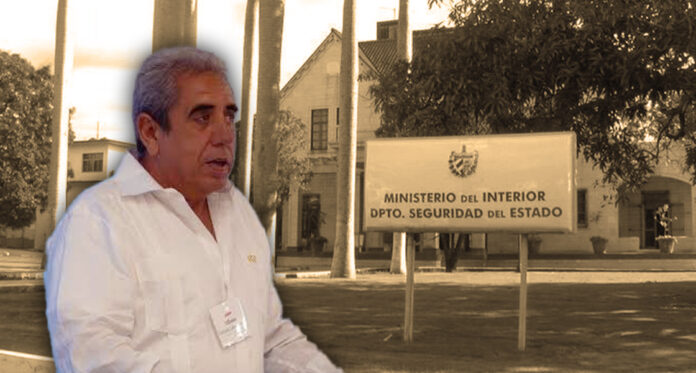Claudia Padrón Cueto | March 5, 2024 | 6:02 am
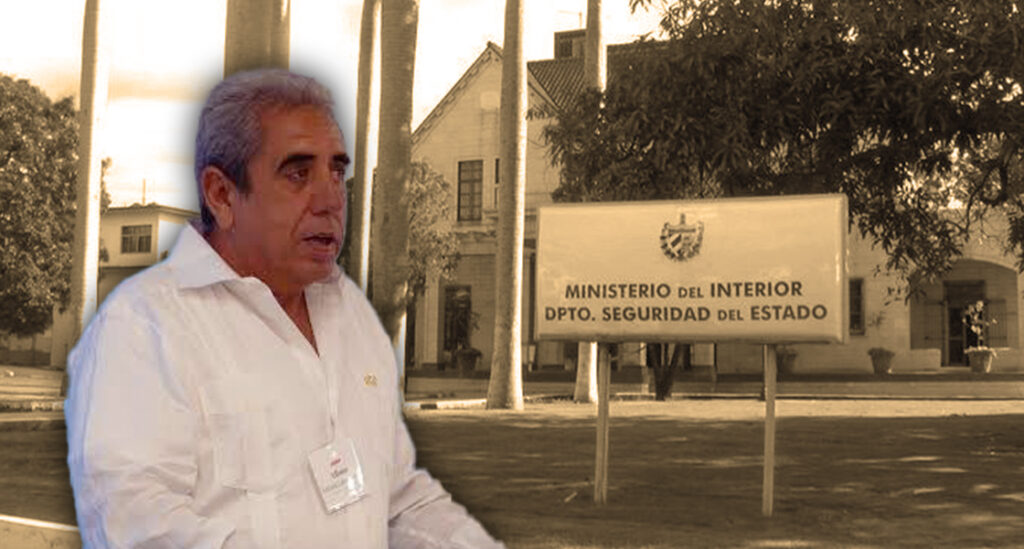
Mexico City, Mexico – On September 26, 2023, a group of 70 representatives from Cuban MIPYMES (micro, small, and medium-sized enterprises) landed in Florida, United States to meet with businessmen, politicians, and U.S. officials. Leading this group was a burly, gray-haired man in his 60s, always dressed in long-sleeve shirts or guayaberas. His name is Alfonso Valentín Larrea Barroso, and it’s not the first time he has captured the spotlight.
Eight years ago, when Barack Obama was in the U.S. presidential office, Alfonso was also introduced as a successful private entrepreneur and one of the most active voices calling for trust in Cuban entrepreneurs. Now, he has returned in a similar role.
He is what we could call the official face of the private sector in Cuba. As the sole administrator of the MIPYMES Evexcon, Larrea has organized business trips abroad involving representatives of other MIPYMES that he selects. Additionally, he hosts networking meetings every week for entrepreneurs to meet and engage in dialogue. Similarly, on his company’s networks, he promotes the activities of prominent merchants who, although not residing on the Island, do business with the Cuban state, like Hugo Cancio or John Felder.
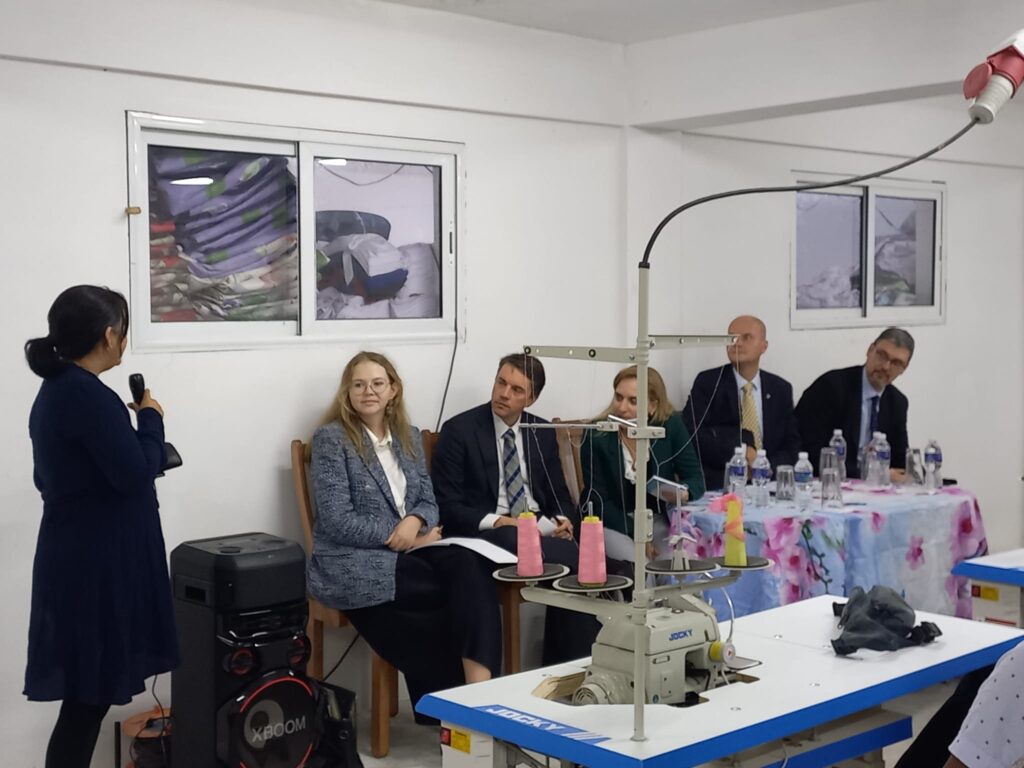
If Cuban MIPYMES owners had an official leader, that role would be filled by Larrea. And it’s not surprising, since the raison d’être of his business is precisely that: to promote the Cuban private sector. That’s why, in articles, events, and informal settings—wherever MIPYMES are discussed—the name of Alfonso Larrea comes up.
Without directly confronting the regime, he focuses on maintaining the idea that, despite all suspicions and criticisms, the Cuban private sector is real and not a mirage constructed by the Government. In every interview, he insists on denying that this emerging space is co-opted by the elite. This would be, he has said, “childish fears,” “the bogeyman story.”
However, he himself has a history of close ties with the Cuban dictatorship. According to former members of State Security and an opposition activist who was his direct victim (all of them consulted by CubaNet), Larrea worked as a police agent and infiltrated the opposition at the end of the last century. Moreover, a brother of his still holds a high position in State Security.
Two of these sources confirm that Larrea continued his working life in commercial positions of state companies without losing contact with the political police.
Later, when the first service cooperatives were approved in 2013, he immediately registered Scenius to provide accounting services mostly to government intities.
Now, with the rise of MIPYMES, Larrea returns and again counts on the support of state media outlets and connects with private entrepreneurs living abroad who have close ties to the Cuban State.
Publicly, he lobbies focusing on defending the interests of MIPYMES owners, with a discourse that aligns with the official one. He does not question the regime for the limitations it continues to impose on the private sector, but rather directs most of his criticism at the sanctions of the United States.
He also denies any relationship between MIPYMES the State, despite some of them being state-owned or having emerged from companies that previously were.
Larrea’s record does not help to dispel doubts that already exist about emerging Cuban private entrepreneurs, a sector caught between the obstacles posed by the regime and the criticism of many opposition activists and exiles.
Agent David
Alfonso Larrea, the man who today presents himself as the leader of the Cuban private sector, testified in the trial against dissident Francisco Chaviano, as confirmed to CubaNet by Chaviano himself and by a former State Security agent who was present during the trial.
Chaviano was arrested on May 7, 1994, and charged with revealing State Security secrets and forging documents. The opposition activist was leading an unauthorized human rights group—the Civil Rights Council of Cuba—and was sentenced by a military tribunal in Havana in April 1995.
The trial was held behind closed doors, and few people were allowed to be present. In this process, the regime presented a list of six political police agents who were infiltrated in opposition groups or in diplomatic activities, whose identities Chaviano had revealed to officials of the United States Interests Section in Cuba (SINA, by its Spanish acronym)).
“He introducecd himself with his full name and the alias he used as a member of the political police and said he had felt fear, and that his life was in danger because I had revealed his identity,” recalls Chaviano, who is now in exile.
Chaviano had never seen Larrea before, but a contact of his within State Security had shared the agent’s details with him and revealed that his task was to infiltrate the opposition; Chaviano shared that same information with SINA.
“From the list, only Larrea was brought up by the Prosecution to testify. He declared that he operated under the name “David,” confirmed to CubaNet the ex-agent who participated in the trial.
Chaviano’s defense attorney responded that several opposition activists knew about, Larrea’s activity as mole; they knew of his relationship with State Security officer Winston Jordan Calzadilla, a notorious repressor of dissidents. And therefore, Chaviano had merely revealed something that wasn’t a big secret.
But Larrea’s statement was decisive in finding the activist guilty of “revealing secrets”; and in April 1995, Chaviano was sentenced to 15 years in prison. He served 13 years and three months of that sentence. During this time, he suffered torture and mistreatment, as he recounted.
“One of the most memorable incidents was when a colonel, the second in command at the Combinado del Este prison, arbitrarily ordered me to take off my clothes in a hallway in front of other prisoners. When I refused to do it, several jailers beat me up and tore all my clothes off in front of the others. Naked, they dragged me to the punishment cell, which was far away. There, they gave me another beating that practically put me out of commission,” narrates Chaviano, who also blames Larrea for the time he was in prison and the humiliations to which he was subjected.
“According to Larrea’s testimony in the trial, among other missions, he infiltrated an opposition group named National Unity Committee, led by José Antonio Fornaris; they had close ties abroad with the Cuban American National Foundation,” confirms the ex-agent, who asked for anonymity for fear of reprisals.
This source and Chaviano agree that Larrea declared in the trial that another of the objectives of his missions was the SINA, to whose headquarters he frequently went to use the library and participate in workshops and courses. “On several occasions, he also held interviews, requested by him with embassy officials,” he said on the stand, as the former agent we consulted recalls.
Although it is not common for the Cuban government to expose the identity of its infiltrated agents during judicial processes, Larrea’s case would not be an isolated one. In 2003, Odilia Collazo, an infiltrated officer, testified alongside seven other agents in the trials against 75 dissidents and journalists. Odilia had been contacted in 1988 by State Security to infiltrate the opposition as agent “Tania” and became one of the most prestigious “opposition activists” of the time.
Two other sources, who wish to remain anonymous (one of them claims to have worked with Larrea as a political police agent and the other knows him and his family personally), confirmed to CubaNet that Larrea is not the only member of his family who has been part of State Security. His brother, Lázaro Romualdo Larrea Barroso, they said, is a lieutenant colonel of the Intelligence division of the Ministry of the Interior and graduated from the International Relations Instituto Superior in 1989.
These testimonies about Larrea’s activity as an infiltrated agent are consistent with the narrative offered by other opposition activists who militated alongside “David” in dissident groups. Before Larrea revealed his true identity in the trial against Chaviano, some opposition activists already suspected that he might be mole.
Larrea, the opposition activist
Between the late 1980s and the start of the next decade, Larrea, then just over 20 years old, worked as a dockworker in a warehouse in Nuevo Vedado that was associated with a foreign company and the Ministry of Transport, according to two former counterintelligence agents consulted who knew him at the time. Simultaneously, he was studying Law in the School for Workers.
It was during this phase, the sources recalled, that Larrea began to approach opposition activists. He did so through his father-in-law, Humberto Hechevarría, who was friends with the anti-Castro activist Mario Viera. With Viera, Larrea entered the National Unity Committee (CUN), an opposition group which at that time was the group closest to the Cuban American National Foundation (FNCA, by its Spanish acronym) on the island.
We are talking about the latter part of the 20th century, when Jorge Mas Canosa, at the helm of the FNCA, was one of the pillars of the Cuban exile community. Mas Canosa was one of the architects of the so-called Cuban lobby; and his stance and determination to end communism on the Island influenced United States policy towards Cuba.
Therefore, for the political police, infiltrating the CUN and José Antonio Fornaris, its leader, was one of the ways to affect the work of Mas Canosa and the powerful FNCA.
“From the moment Alfonso arrived at CUN, I saw him interested in getting close to me because of my relationship with Mas Canosa. He even visited my mom on his own as a way to gain my approval,” recounts Fornaris, now exiled in Costa Rica.
Back then, the one who would later present himself as agent “David” was a likable young man. He enjoyed making jokes and could come up with a witty comment on any topic. He did not go unnoticed and was pleasant, according to the opposition activists who knew him. However, they clarify that he soon raised suspicions, just like other CUN militants, such as Fausto Adolfo Martí and Héctor Castañeda, who turne out to be government moles as well.
“The three [Martí, Castañeda, and Larrea] coincided in that they tried to influence us to change the ams of our organization. They created divisions and internal problems,” recalls Fornaris, adding that State Security was always one step ahead of their activities.
Suspicion increased when Larrea transmitted information about an event that never happened: an alleged mass resignation of militants from the Union of Young Communists (UJC, by its Spanish acronym). Apparently, “his objective was for the CUN to spread this and be exposed for lying,” comments Fornaris.
This is a usual tactic that State Security resorts to in order to show how the opposition is not reliable.
To leave the Country, the Constant Advice
Suspicions against Larrea increased because he was very insistent on encouraging other opponents to leave the country. Both Fornaris and Mario Viera assert that Larrea constantlyly emphasized to them that the best option was to leave Cuba. To Viera, the person who introduced him to the opposition, Larrea proposed the following plan:
“He talked to me about a group of soldiers who were going to desert with very important documents and would leave in a boat for Miami. Alfonso [Larrea] was supposedly going to help them by stealing an engine from the warehouse where he worked. He invited me to join them. Honestly, at that time, I thought it was naïve of him.”
Viera had a pending case for attempting to leave the country illegally. If caught committing the same offence again, he would be immediately sent to prison. Moreover, as the proposal seemed somewhat far-fetched to him, he declined Larrea’s offer.
“I was imprisoned for a year in 1991 and when I got out, Alfonso had gained renown within the opposition. He was constantly at the United States Interests Section in Havana. He even took me with him once, and I could see how close he was to some U.S. officials and how they listened to him,” recalls Viera.
This opposition activist, now exiled in the United States, narrates that he decided to distance himself from Larrea when he confirmed that Larrea, while active in CUN, was also active in the UJC and had not lost his job with a foreign company, an especially attractive position. “What opponent who rubs shoulders with the Interests Section is allowed to work in Cuba, let alone in something important?” reflects Viera.
It is common in the island for simple employees to be fired if they openly criticize the government and for opposition activists to be prevented from accessing many jobs.
Regarding being hired by foreign companies, this is done through the State, which filters who gets the job. A dissident who visited SINA and was active in CUN would not be suitable for the job Larrea had. Unless he was not really an opposition activist.
On the island, people who help or are part of State Security can be divided into three fundamental categories: the agents themselves; collaborators who act out of ideological conviction, also called “trusted persons”; and collaborators who do so for some personal, material interest, fear, or blackmail.
The most significant tasks, such as infiltrating opposition groups, are usually the responsibility of the first group, i.e., the agents.
“An agent is a person who has been recruited, who has a file, with official training to do this type of work. He is an undercover officer,” explains a former counterintelligence worker we consulted.
The source, who knows Larrea, describes him as “an ideological agent” who “acted out of conviction.”
After the trial against Chaviano, the opposition activists that we consulted lost track of agent “David.” According to the sources interviewed, Larrea not only stopped visiting the U.S. diplomatic headquarters but also changed jobs.
From agent to entrepreneur
With his law degree in hand, Larrea went through a variety of occupations, mostly in ministries in commercial advisory positions, as detailed in his LinkedIn profile.
He first was at the news agency Prensa Latina, where he stayed until 1998. From there, he landed as a commercial specialist in the Wajay Free Zone. After about five years, he moved to the Ministry of the Fishing Industry. And in 2007, he was appointed a specialist at the Martí Program Office, part of the Council of State, Cuba’s highest governing body. His last job was in the Ministry of Culture.
This information, published by Larrea himself, could not be fully corroborated with the interviewed agents who knew him. But they do affirm that he remained in state outfits, without breaking his ties with State Security.
This is not unusual. Some agents are assigned to institutions outside the Security organs, but from their new positions, they continue to collaborate with the political police.
Larrea’s public life as a private entrepreneur begins as the restoration of relations between Cuba and the United States approached, during the second term of President Barack Obama, at the beginning of the last decade.
A faint support for private initiative was the goodwill gesture that Raul Castro’s administration could display as a sign of opening up. As is the case today with the presidency of Joe Biden, the private sector was the card Cuba brought to the table to convince Americans that the country was really changing.
And indeed, some transformations were seen: in the main cities of the country, restaurants, bars, gift shops, technological ventures opened… Cuba became fashionable abroad and restrictions for American tourism who had begun to arrive, were eased.
This was partly possible because the regime legalized the initial forms of private enterprise: the so-called non-agricultural cooperatives, which were approved at the end of 2012. In these spaces, private individuals, known as self-employed workers, could join and offer joint services.
One of these cooperatives, probably the best known, was Scenius, which focused on providing accounting advisory services.
In January 2015, months after Raúl Castro announced on television that the “Cold War” had ended, Scenius came to life and didn’t stop growing.
Its services included drafting financial statements, bookkeeping, inventory control, or tax advice to companies
Everywhere, people talked about the cooperative of private individuals that was being successful within the limited and battered Cuban state economy. The international press cataloged it as a “leader” in this sector, and in addition to the capital, they expanded to Matanzas and Camagüey. They had achieved the unthinkable. They were praised for how far they had come.
An initiative of three partners with an initial capital of 300 dollars managed to invoice more than two million dollars and employ about 300 workers, as Larrea himself explained to the press.
However, behind this success story was a paradox. The cooperative did not prosper by providing services to the private sector. Scenius did not focus on the sectors that emerged with the thaw, the sectors that attracted self-employed workers: tourism or restoration. Most of the clients to whom Scenius provided accounting services, about 90 percent, were state enterprises, as Larrea himself detailed.
What he never explained was how they obtained such a broad portfolio of government-dependent clients, being such a young private company that no one knew.
As the cooperative became a benchmark, two of its founders gained some fame. The president of Scenius, Luis Alberto Dueñas, was a professional engineer who had worked as a merchant marine and who, along with Larrea, set up the venture.
Although he did not reach Larrea’s visibility, Dueñas also gave interviews to the foreign press. In one of them, he warned foreign businessmen with interests in Cuba that the economic opening was not going to mean “filling the country with McDonald’s.” Dueñas made it clear that entrepreneurs like him worked under the rules of socialism and were “graduates of the Revolution.” Therefore, they would not allow foreigners to impose unrelated political interests on them. He also described the government’s performance in the face of the thaw as “quick,” but “cautious” and “efficient.”
Alongside Dueñas, Larrea was also a highly quoted voice on the matter. He was the subject of articles in both the independent and the official press, led workshops, provided consultancies, even traveled to the United States. Without a doubt, he was one of the men of the moment for the private sector.
The end of Scenius
Everything at Scenius seemed to be going well until the context changed radically. The thaw slowed down after the attacks of unknown origin that the staff of the US embassy in Havana suffered starting in 2016. By then, the regime was already obstructing the development of self-employment and cooperatives; as a result of these measures, about 80,000 people gave up their self-employment licenses.
This was compounded by the arrival of Donald Trump to the White House in 2017. The former president, a Republican, reversed the policy towards Cuba: he restricted travel to the island, tightened sanctions, and targeted the country’s most important business group, owned by the Cuban military, GAESA.
It was in this context that the Cuban authorities decided to put the brakes on Scenius, to end the fairy tale.
On August 7, 2017, the state portal Cubadebate officially announced that Scenius had been dissolved for alleged violations committed by the cooperative. According to them, Scenius had provided services not contemplated under its license. For example, they prepared cost sheets for their clients, which is an accounting service, but was not included under the license.
To this day, we do not know why Scenius fell from grace, nor why the process of economic reforms was stopped. For some observers, these changes ceased to be of interest to the regime when they were no longer useful in obtaining concessions from the United States. For others, the closure of Scenius and, in general, the brake on private initiative, were symptoms of the internal disputes within the regime between more reformist sectors and more orthodox ones.
In this context, economist Emilio Morales, who has researched the Cuban private sector for years, believes that the thaw and economic opening produced fear of a loss of control among some powerful military figures. “To General (Luis Alberto Rodríguez) López-Calleja, then CEO of GAESA, a sweeping movement of independent entrepreneurs, with greater business power and greater financial autonomy, was inconvenient because it would prevent the supremacy of the Army’s conglomerate and would cut off its billion-dollar revenues in dollars,” Morales thinks.
Regarding the shutdown of his business, Larrea himself wrote a public letter criticizing the decision and arguing that the alleged breaches were false. He even suggested that it was a reprisal. He said that the real reasons for closing the company were different and that he was going to explain them. He never did.
After the shutdown of Scenius, the entrepreneur generated more public interest and occupied headlines that presented him as a kind of “reformist” whom the regime, or at least a part of it, had wanted to remove from the game.
On the same day, August 7, 2017, that the closure of Scenius was announced, Larrea published the first of six texts in the independent medium El Toque on how cooperatives were seen as enemies of the state sector.
But the closure of Scenius increased his presence not only in the media but also in receptions held at the US embassy in Cuba. He had gone from being one of the entrepreneurs of the moment to being a victim of regime repression.
“After the shutdown of the cooperative, Larrea became more famous and attended every event that was held at the Embassy. He was invited more frequently, I suppose because of the notoriety he had. He became a martyr of self-employment,” comments an independent journalist who at that time coincided with him at many events of the US diplomatic mission.
In 2019, the entrepreneur signed his last article in El Toque, asking to let cooperatives work. That would be one of his last public appearances to date.
The return as a MIPYME Owner
On January 20, 2021, Biden became President of the United States, and with him, the Democratic Party returned to the White House. Trump’s failure to be re-elected was good news for the Havana dictatorship, which had seen how the now former president promised a tougher stance against Castroism if he were to win a second term.
In contrast, with Biden, who had been part of the thaw as Obama’s vice president, the outlook was more encouraging. And the regime desperately needed a break.
Cuba was going through a severe economic crisis, worsened by the COVID-19 pandemic. The collapse of tourism, the country’s main industry, had led to a series of unpopular measures aimed at dollarizing the economy and cleaning up finances. And, partly in response to these measures, on July 11, 2021, for the first time since 1959, people across the country took to the streets to protest, which in turn unleashed a wave of historic repression.
Thus, in need of boosting the economy, improving its image, and with a new tenant in the White House, the regime began to show signs of economic opening.
Months after Biden’s rise to power, the Cuban authorities introduced a legal form that allowed individuals to create a private company. This time they did not talk about cooperatives as during Obama’s thaw, but about MIPYMES.
The United States has demanded the empowerment of the Cuban private sector and tried to make its sanctions more selective to affect state enterprises, but not private businesses.
In this way, MIPYMES, in addition to being a nod to the historical enemy, were also a response to the popular protests of July 11, 2021; just as the opening in the 90s was to the Maleconazo of 1994.
“Openings in Cuba start with internal crises when the water goes up to your nose. Then, these reforms are packaged in a propaganda campaign that promises changes and sells them abroad. It’s a way to seek additional benefits from something you had to do because your internal actors forced you,” states Cuban historian and analyst Juan Antonio Blanco.
This is how Larrea returned with a new business. Although the authorities had arbitrarily closed his previous venture, he did not hesitate to venture again into creating a private company in Cuba.
Evexcon, Larrea’s new business, is company number 72 on the official list of MIPYMES. And as happened with Scenius, Evexcon, again, has had the constant accompaniment of official media, which has highlighted its management as an organizer of events for MIPYMES.
For example, in November 2021, the website of Radio Taíno dedicated a note to promoting the first Evexcon workshop, just a month after the announcement of the creation of the first MIPYMES. A year later, Prensa Latina agency dedicated a couple of notes to promote said company and its events in the Dominican Republic, trying to connect the Cuban private sector with international companies.
Precisely, Larrea’s business model is that which official media highlight. Evexcon exists to place members of the Cuban private sector in common spaces to encourage alliances and possible businesses.
Larrea’s company organizes networking events at the Havana bar 2.45, owned by the famous athlete Javier Sotomayor. Interested parties pay just 200 Cuban pesos (less than a dollar) and have access to the event.
2.45 is a venue that other entrepreneurs close to the regime have used for similar purposes, including Hugo Cancio to promote Katapulk and his new food brand.

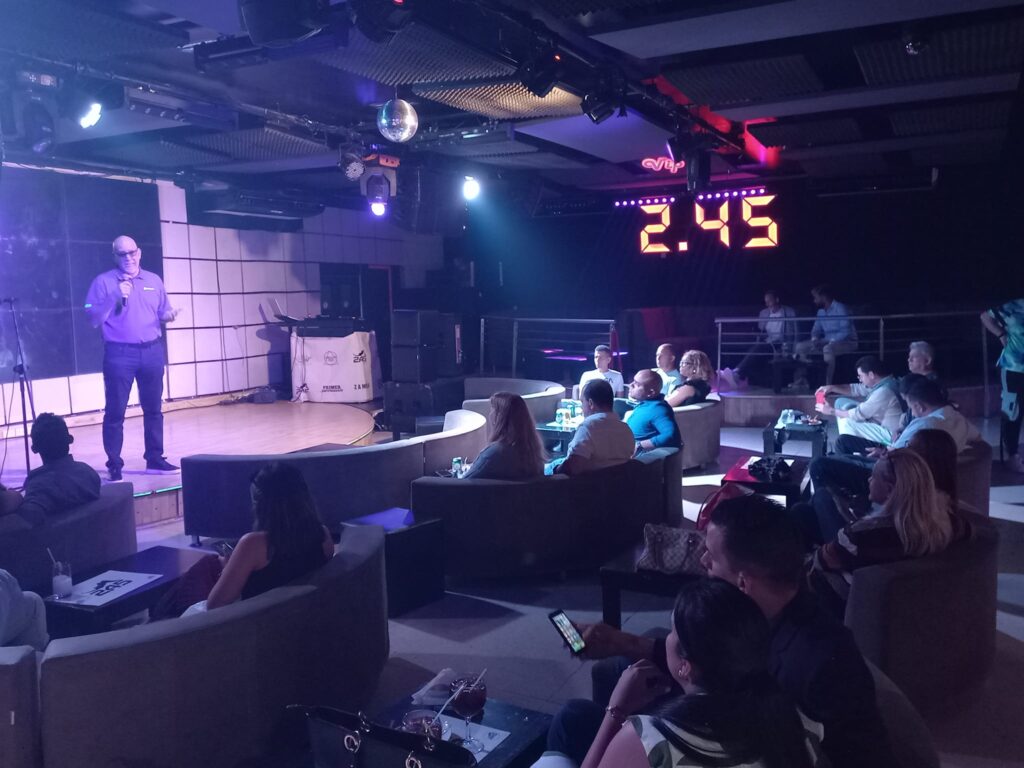
Another purpose of Evexcon is to coordinate international events that make the emerging Cuban private sector visible and allow it to learn from other contexts. Before landing in Florida in 2023, Larrea’s MIPYME had already managed to take a group of entrepreneurs to the Dominican Republic and to Isla Margarita, in Venezuela. In the Dominican Republic, they even went on television programs to promote their businesses.
Another target in Larrea’s sights seems to be the diplomatic missions established in Havana that have historically supported civil society. In early February 2024, Evexcon published on its networks that Jiří Kozák, Deputy Minister of Foreign Affairs of the Czech Republic, had attended a meeting with Cuban MIPYMES owners alongside the ambassador of that country. The meeting was arranged by Evexcon.
Therefore, Larrea dedicates himself to providing services to other private companies, a sector that is nascent and diverse but generally fragile and facing many obstacles, so it is not very clear how he manages to sustain Evexcon’s activity, namely the trips or workshops it organizes.
Larrea was contacted by CubaNet to inquire about this and other issues, such as his time in State Security, but he refused to answer any questions. Other Evexcon clients also declined to be interviewed.
MIPYMES as a lifeline
But Larrea’s functions are not solely related to business matters. His mission is also political: to generate a public discourse focused on showing how private initiative is flourishing in Cuba and how this can be a way out of the economic crisis that is suffocating the country.
His discourse is not the usual one among communist cadres. It is, although without addressing systemic problems or human rights violations, more grounded. Larrea does not ask to endure misery with “creativity,” as ruler Miguel Díaz-Canel has done. The entrepreneur presents private enterprise as a lifeline for people to progress and calls for concrete measures to encourage entrepreneurship.
Larrea, for example, asks that SMEs be allowed to directly import goods, without the need to resort to state intermediaries, as is currently the case.
He also demands that the United States government give Cuban individuals access to its banking system. Both are recurring demands of the self-employed.
For him, the real possibility of changing the Cuban landscape lies in the private sector, not in the political opposition. “If it’s about transforming, changing the Cuban landscape, the Cuban private sector has done more in a few years than the so-called opposition in 60 years,” one can read in one of his LinkedIn articles.
And in that formula for success for Cuba, he has focused his discourse, emphasizing that MIPYMES are truly independent. Larrea reiterates this idea in response to one of the main criticisms that the “new” form of property receives.
But his detractors point out the weakness of this discourse. For many opposition activists and analysts, MIPYMES are not alien to the regime, but a strategy of the regime, among other things, to circumvent U.S. sanctions.
To demonstrate this, they argue that several of the new MIPYMES are directly state-owned or emerged from companies that were state-owned until 2021. They also question that part of the new businesses are owned by frontmen or relatives of people connected to the regime’s elite or State Security agents.
Evexcon, in fact, has among its clients MIPYMES that, in theory, are private but fit into one or more of these categories.
Landing in Miami
In September 2023, Larrea arrived in Miami leading a delegation of dozens of Cuban entrepreneurs. During the Obama administration, visas and invitations had been granted to entrepreneurs of the moment, including Larrea, but the Cuban delegation had never been as large as it was now.
Before flying, Larrea had to process his visa, for which filling out the DS-160 form is mandatory. Near the end of this form, it asks: “Have you ever committed, ordered, incited, assisted, or otherwise participated in torture?”
Furthermore, in the subsequent interview with a U.S. official, it is common for them to ask if the person applying for the visa has worked directly for the regime.
Since Larrea obtained his permission to travel to the United States, we can guess that in his answers to these questions, the former agent “David” did not mention his time in a repressive body or his contribution to the torture of an opposition activist like Chaviano in prison.
Although the visas were granted, “the expedition,” as they called it, was a private trip in which the United States did not participate in its organization, so it is not very clear how it was funded.
When asked about this, U.S. diplomats in Havana specified to CubaNet that “U.S. government representatives attended some workshops to explain the current regulations that govern commercial transactions, but did not play any role in coordinating or managing the program.”
Larrea, however, played a significant role, not only traveling as the leader of the group but also personally selecting the participants. In several interviews, he has stated that Evexcon was in charge of compiling the list.
“Contrary to what many in the United States think, that we are envoys of the Cuban government, it is not the case. Nor were those of us who came here selected by a state call,” Larrea stated to OnCuba.
“The Cuban entrepreneurs who traveled to Miami are those who trusted us from the start, in Evexcon, as a private company that has organized events,” he specified.
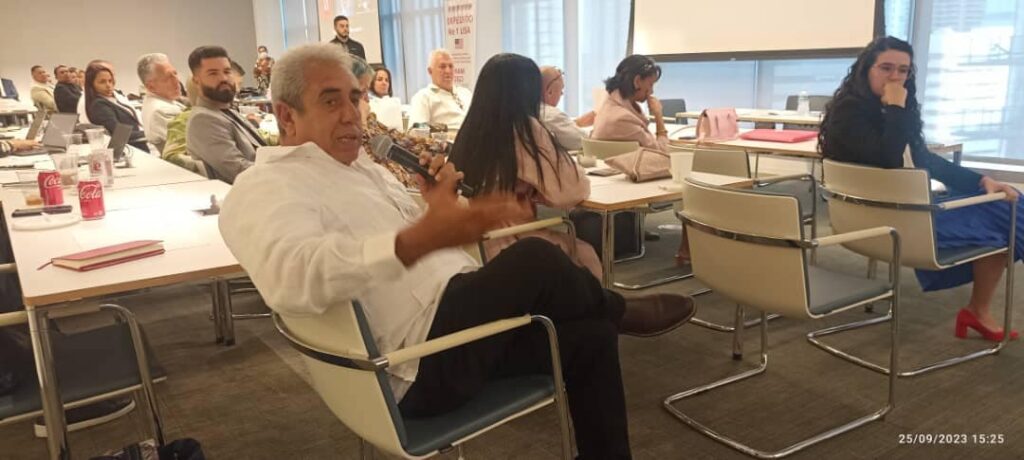
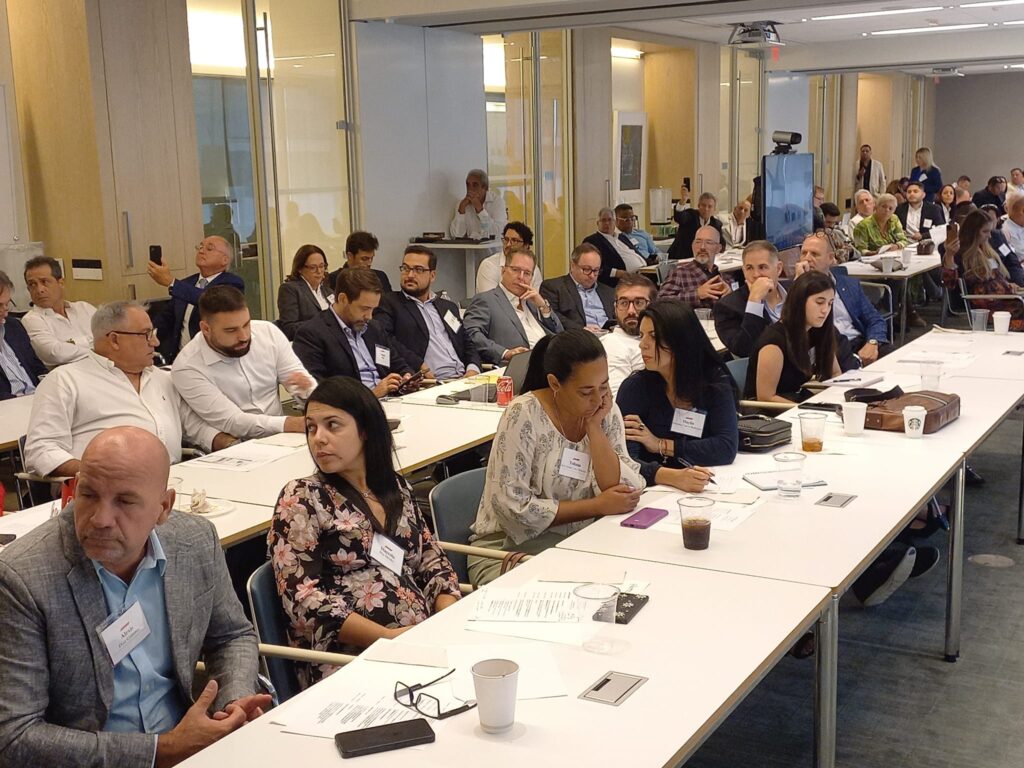
That it was, at least publicly, the former agent “David” who led the trip to Florida has also been confirmed by Oniel Díaz, partner and general manager of AUGE company, another of the main faces of the Cuban private sector.
With Larrea organizing from Havana, the other part of the event was handled by former Florida congressman Joe García. This Democratic politician is a known supporter of normalizing relations between both countries and has positioned himself in favor of MIPYMES.
Alongside García, the Miami law firm Akerman also participated in the meeting. This firm has advised entrepreneurs interested in doing business in Cuba for 20 years. One of their specialties is how to operate on the Island without violating the embargo.
With these three pillars: Larrea from Cuba, and García and Akerman from Miami, the Cuban entrepreneurs landed in the capital of the exile community to have intense days of visits and meetings.
Who traveled to Miami?
During the first few days, the program consisted of panels and presentations. Subsequently, the Cubans visited the offices of potential suppliers and business partners.
The first business they got to know was Crowley company, a shipping company based in Fort Lauderdale that sends cargo to the Island and also has an online store where it sells food, which is then sent to Cuba. From there, they moved on to a construction company, a museum, and, finally as expected, the “MIPYMES owners” met with Hugo Cancio.
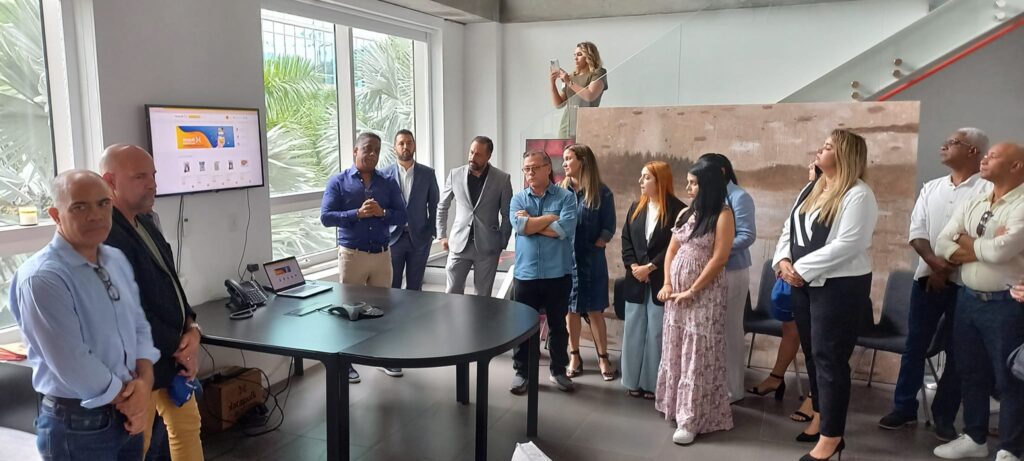
The flagship Cuban-American entrepreneur of the thaw welcomed them at the office of Fuego Enterprises, to which his well-known online store Katapulk belongs.
The list of those who participated in these visits was never published. Only through some press reports did it emerge that there were textile companies like Los Hilos de Ariadna, Confecciones Ramos, or Zory; a beauty products company called D’Cabellos; several technological ventures; and some food producers like Conservas El Roble, Media Luna, La Ceiba, or Reina Victoria.
Several of them are businesses closely linked to the state economy. Media Luna, for example, is the first MIPYME approved in Ciego de Ávila and in the recent past was a state-owned food company that was later transformed into a “local development project” (a form of public-private enterprise) and that, finally, evolved into a MIPYME.
This peculiar “non-state” business frequently shares speeches by Fidel Castro in its social media posts; remembers his death with sadness and celebrates episodes of the Revolution like the anniversary of the assault on the Moncada Barracks.
Whether by choice, convenience, or habit, what it projects on its social networks is exactly what would be expected from a company controlled by the Cuban regime. But Media Luna presents itself as a private business.
Media Luna sells meat and about 60 different food products. Among them are processed fruit products from the Tuaba line. This brand sells through Supermarket23, a business previously investigated by CubaNet, and which is managed by individuals linked to the family of Commander Guillermo García Frías.
Media Luna is not the only MIPYME in the delegation that was until recently a state enterprise.
A similar story of conversion to a MIPYME is Agroindustrial La Ceiba. This business was dedicated to the export of charcoal, one of the activities traditionally controlled by the powerful García Frías family, but now it also processes fruits mostly intended for tourism and export.
Like Media Luna, La Ceiba sells its goods on online platforms that are mostly directly controlled by the regime or its frontmen. La Ceiba is also very active on social networks spreading political propaganda and praise for the Cuban dictatorship.
CubaNet was also able to verify, upon reviewing the activity program of the delegation, that representatives of at least two other MIPYMES with proven links to the Cuban regime traveled to Miami. These are 25MN SRL and TL38 SRL, two businesses, interconnected, that specialize in the online marketing of food products.
The first of these businesses was registered by Juan Alejandro Quevedo Ponce, son of Aníbal Quevedo, a frontman investigated by CubaNet. The second is under the name of Yureibys Pérez Blanco, who is close to Quevedo senior.
Both Quevedos, father and son, as well as Pérez Blanco, have represented companies created in Spain, Panama, and the United Kingdom to export charcoal from Alcona, one of the state enterprises controlled by the García Frías family. This group has also been involved in managing e-commerce pages, including Supermarket23.
These “mipyme owners” did not have to travel to the United States because they already reside there. Opportunely, however, they decided not to play a leading role in the tour, and other representatives of their companies spoke to the public, as reflected in the travel itinerary.
To Miami, along with these businesses, also came the representatives of Dofleini, a software company that works for multiple state enterprises and, in fact, manages the registration of MIPYMES for the government. One of its founders is currently part of the National Assembly of Cuba.
These examples highlight one of the criticisms that have most frequently been made of MOPYMES: that creating one is not within everyone’s reach. This seems to be a privilege, especially when we talk about large businesses, of people who openly support the regime and have developed their career in high positions of state enterprises. People like Larrea himself.
Larrea returns to Cuba but leaves office in Miami
In early October, the delegation of “mipyme owners” returned to the Island with, as far as we know, one concrete result: they now have an office in Miami “for support and coordination to facilitate relations.” They did not provide many more details on this, except that it is a shared space with a travel agency in Miami-Dade.
The rest of what the visit promised has remained in a doubtful scenario, such as the possibility for Cuban entrepreneurs to have bank accounts in the United States or to operate with dollars in the international market. These are two basic claims of the MIPYMES, so far, very difficult to achieve because U.S. sanctions prevent them from materializing.
Indeed, allowing Cubans to use dollars for trade abroad, in addition to being a claim of the new private sector, has also been a long-standing desire of the Havana regime. To evade this prohibition, the state sector has registered opaque companies in tax havens, and even in the United States through frontmen.
Academic Juan Antonio Blanco, who currently presides over the Cuba Siglo 21 Ideas Laboratory, believes that with more than 10,000 MIPYMES approved to date, it does not seem sensible to assert that all of them are controlled and managed by the Cuban government. In that group, probably converge the business of an ordinary Cuban and that of a frontman, with the latter having greater chances of success. But the person who dissents from the regime will hardly manage to register a MIPYME in Cuba.
This is one of the central conflicts surrounding the growth of the private sector in Cuba: the political discrimination that accompanies the process.
“A truly private and independent sector in Cuba is a fallacy because there are no basic freedoms for private property, nor the rule of law to support them. The first thing is that you need government authorization to register a MIPYME with all the filtering process that it entails, which goes from the base to the minister,” explains the expert, who highlights that part of those reviews respond to purely ideological criteria.
“If another country promoted an MIPYME law that banned black people, LGBTIQ+ people, women, already regularized immigrants, the United States would not support it because it is clearly discriminatory. That’s what happens in Cuba, where segregation is for political reasons. The selection process eliminates the opportunities of those who dissent,” asserts Blanco.
Unlike what happens in most countries, where the registration of a company consists of a simple administrative procedure in which the State only ensures that some legal requirements are met, in Cuba, the process is intended to serve as a filter. Different state institutions can veto or give the green light to a business, regardless of whether it meets the conditions established by law or not, something that Larrea was able to verify with the shutdown of Scenius, but now seems to overlook.
“It must be remembered that for a citizen to have an MIPYME, he or she must pass different approval filters: the local People’s Power, the Communist Party of Cuba, military counterintelligence, and the Ministry of Economy and Planning,” adds economist Emilio Morales.
The past that Larrea hides
Discrimination even extends to mere employees of a private business. Early last January, the former political prisoner José Antonio Pompa López was dismissed from the restaurant Pizzas Pachi, located on 17th Street, in El Vedado, Havana. Pompa told CubaNet that after pressures from State Security, the owner of the establishment asked him not to come anymore for having told the independent press about the lack of medical attention for his young son.
And Pompa is not been the only one. In February, the media outlet ADN América published that Cuban artist Álvaro Hernández had been dismissed from the MIPYME MadWoman, a marketing agency based in Havana. The reason was that Álvaro wrote “Down with the dictatorship!” on the social network X.
But these are the kind of issues that Larrea prefers not to address in his eagerness to defend the Cuban private sector.
Shortly after his return to Havana, in an interview he gave to YouTuber Guennady Rodríguez, known for his support of the Democratic Party, the end of sanctions, and backing Cuban entrepreneurs, agent “David” gave his viewpoint about the trip.
Larrea reiterated how necessary it would be to have bank accounts in the United States to avoid being forced to fly with cash in his pockets. He also asked the exile community to share their experiences of “hard work” with the private sector inside the island. They, he said, did not see Cubans abroad only as sources of financing, but also as a source of knowledge. Beyond political differences, Larrea stated, the path is understanding to change Cuba through new ways.
In that space, he also lamented the criticisms and opposition that MIPYMES have had to face. “We are receiving more rejection within Cuba than from the United States.” Afterwards, he denied that there were government or Ministry of the Interior moles in the group. He even insisted: “We are accused of being privileged, of being part of the government, but that is not true. We know that over time it will become clear.”
What Larrea did not address in this or other interviews or in his own articles, is what multiple sources told CubaNet: how agent “David” infiltrated the opposition, how he visited SINA presenting himself as a dissident, how he helped to condemn an opposition activist to 15 years in prison.

Claudia Padrón Cueto
Periodista. Egresada por la universidad de La Habana en 2015 y como máster en Comunicación en 2021 por la Universidad Iberoamericana de México. Ha trabajado como periodista para diferentes medios independientes cubanos y se ha especializado en cobertura a grupos vulnerables y periodismo de investigación.
COMMENTS
Este sitio web utiliza cookies. Al continuar utilizando este sitio web, usted da su consentimiento para el uso de cookies. Visita nuestra Política de Privacidad y Cookies.


